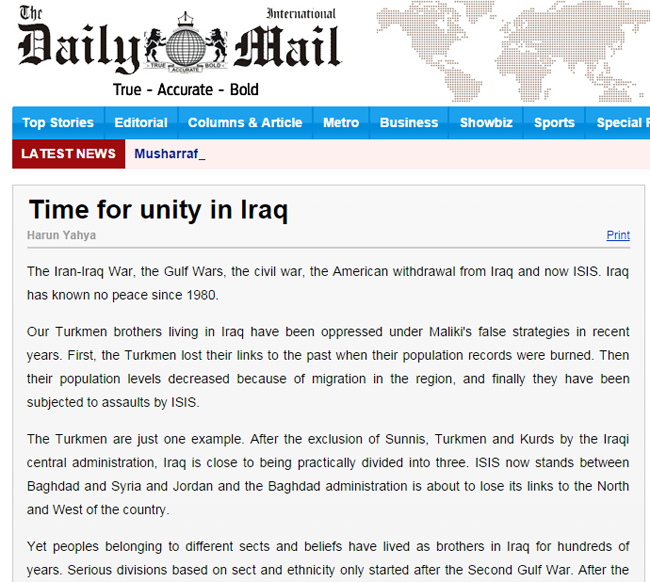
The Iran-Iraq War, the Gulf Wars, the civil war, the American withdrawal from Iraq and now ISIS. Iraq has known no peace since 1980.
Our Turkmen brothers living in Iraq have been oppressed under Maliki's false strategies in recent years. First, the Turkmen lost their links to the past when their population records were burned. Then their population levels decreased because of migration in the region, and finally they have been subjected to assaults by ISIS.
The Turkmen are just one example. After the exclusion of Sunnis, Turkmen and Kurds by the Iraqi central administration, Iraq is close to being practically divided into three. ISIS now stands between Baghdad and Syria and Jordan and the Baghdad administration is about to lose its links to the North and West of the country.
Yet peoples belonging to different sects and beliefs have lived as brothers in Iraq for hundreds of years. Serious divisions based on sect and ethnicity only started after the Second Gulf War. After the 2010 elections in particular, Maliki subtly adopted a policy of 'Shi'afication' following the marginalization of the Sunnis and local tribes. This wrong-headed politics hindered the equitable representation of the entire Iraqi people in administration and obstructed the protection of their rights.
The Iraqi Kurdish Regional Administration (IKRA) and the central administration in Baghdad have had major disagreements over sales of oil from Northern Iraq.
When ISIS captured Mosul, peshmerga fighters loyal to Barzani heeded the Turkmen call, entering Kirkuk and Tuzhurmatu and declared they would safeguard the public against ISIS attacks.
The PKK's approach to events involving ISIS is a more cunning one. The PYD/YPG in Syria suffered heavy losses in the fighting against ISIS, and that defeat inflicted major damage on the PKK's plans for northern Syria.
The PKK is also trying to establish a rapprochement with the IKRA and with the European countries; they are suggesting that Europe should protect their rights in Iraq and want to have themselves taken off the International List of Terror Organizations as a result of this rapprochement.
Iran, another neighbor of Iraq's, is in a very strong position in the Middle East.
Iran's strategy in Iraq resembles its strategy in Syria: Iran is providing all kinds of backing for the troubled Maliki, and is employing the same tactics in Iraq as in Syria. The weakened Assad achieved major success against the opposition with support from Hezbollah. We will likely soon begin to see Iraq using Hezbollah in the fight against ISIS.
Najaf and Karbala in Iraq are Iran's sensitive points; it may become directly involved in the event of an ISIS attack on that area. The USA's recent rapprochement with Iran and refusal to send troops to Iraq may mean that it will not react in the event of such an intervention.
Russia's approach is shaped by its energy revenues. A reduction in Middle East oil processing - for any reason - will be of great benefit to Russia, a large part of whose national revenues come from energy sales. Russia is therefore quite content to see countries in the region weakening. However, Russia has a red line as well and that red line the Russian maritime base in Syria.
The USA, which began withdrawing its troops from Iraq in 2011, is carefully watching events in the country. The aircraft carrier it sent to the waters off Basra certainly keeps the possibility of air strikes on the agenda. The USA has also decided to send in 300 military advisers to Iraq.
One of the main reasons why Iraq has descended to such an alarming state is a toxic combination of domestic sectarian conflict, ethnic conflict and some Western countries fighting for more control of its energy revenues.
Iraq seems to have entered a process of splitting into three, with IKRA in the North, the Sunnis around Mosul and the Shiites in the South; ISIS has even declared an Islamic State. The strategy of divide and rule that was applied by the British and French in Africa in the early 20th Century is once again being applied there, too.
Muslims can overcome this strategy of 'division', implemented since the last century, only by acting in 'unity'. Otherwise they can never escape the current fighting, death, slaughter and poverty.
Small Sunni, Shiite and Kurdish states declaring independence in Iraq will benefit Iraqi society not one whit, and will merely serve the interests of some Western countries. What needs to be done in Iraq is to put a stop to sectarian fighting, to firmly establish the understanding that all Muslims are brothers and to ensure that all of Iraqi society lives as one in a spirit of mutual love, affection and understanding.
The Iraqi people must first establish unity among themselves then they must lead the way to unity among the peoples of the regions so the wars can come to an end. These communities that lived together as brothers for hundreds of years under Ottoman rule in Mesopotamia can again live as one, but only as long as they can see that this is the only solution.
Adnan Oktar's piece on Daily Mail:
http://www.dailymailnews.com/2014/08/27/columns-articles/1.php


